Premier William Lai (賴清德) yesterday told reporters that his approach toward Taiwanese independence was pragmatic and based on three tenets.
Lai held a media roundtable in Hualien County, where reporters asked about his depiction of himself as a “political worker for Taiwanese independence.” He had once again used the term at an April 3 seminar on freedom of speech held by the Ministry of the Interior.
He said the first tenet is that Taiwan is a sovereign, independent nation and therefore does not need to declare independence, Lai said.

Photo: Lee Hsin-fang, Taipei Times
The second is that only the nation’s 23 million people have the right to decide Taiwan’s future, and the third is that building up Taiwan and making it stronger and more attractive to people so that they support it is a practical approach to Taiwanese independence, Lai said.
Working for Taiwanese independence involves safeguarding the nation’s sovereignty, protecting its freedom, democracy and human rights, and safeguarding the public’s right to decide Taiwan’s future, he added.
It also means developing the economy and creating growth so that people can live and work in peace; maintaining peaceful development and enhancing mutual understanding across the Taiwan Strait; and working with Japan, South Korea and the US to ensure security in the Asia-Pacific region, he said.
While Lai has consistently emphasized his role as a “Taiwanese independence worker,” it has taken different tones over the past year.
At the April 3 seminar, Lai recalled saying during his first administrative report to the Legislative Yuan as premier in September last year that he was a “Taiwanese independence worker,” but added: “I did not say I advocate Taiwanese independence.”
However, in that report on Sept. 26, Lai told lawmakers that when he was Tainan mayor, he had told the city council that he was a “political worker who advocates Taiwanese independence” and that “this will not change, no matter what position I am in.”
In June last year, while still mayor, Lai said he felt an “affinity toward China as much as he loves Taiwan,” and argued at the legislative hearing in September that this did not contradict his stance on Taiwanese independence.
Chinese media reported that live-fire exercises in the Taiwan Strait scheduled for Wendesday by the People’s Liberation Army on Wednesday would serve as a warning after Lai’s pro-independence statements.
However, Lai yesterday said that his support for Taiwanese independence started in the 1990s and his political beliefs are well known.

‘ABUSE OF POWER’: Lee Chun-yi allegedly used a Control Yuan vehicle to transport his dog to a pet grooming salon and take his wife to restaurants, media reports said Control Yuan Secretary-General Lee Chun-yi (李俊俋) resigned on Sunday night, admitting that he had misused a government vehicle, as reported by the media. Control Yuan Vice President Lee Hung-chun (李鴻鈞) yesterday apologized to the public over the issue. The watchdog body would follow up on similar accusations made by the Chinese Nationalist Party (KMT) and would investigate the alleged misuse of government vehicles by three other Control Yuan members: Su Li-chiung (蘇麗瓊), Lin Yu-jung (林郁容) and Wang Jung-chang (王榮璋), Lee Hung-chun said. Lee Chun-yi in a statement apologized for using a Control Yuan vehicle to transport his dog to a

Taiwan yesterday denied Chinese allegations that its military was behind a cyberattack on a technology company in Guangzhou, after city authorities issued warrants for 20 suspects. The Guangzhou Municipal Public Security Bureau earlier yesterday issued warrants for 20 people it identified as members of the Information, Communications and Electronic Force Command (ICEFCOM). The bureau alleged they were behind a May 20 cyberattack targeting the backend system of a self-service facility at the company. “ICEFCOM, under Taiwan’s ruling Democratic Progressive Party, directed the illegal attack,” the warrant says. The bureau placed a bounty of 10,000 yuan (US$1,392) on each of the 20 people named in

INDO-PACIFIC REGION: Royal Navy ships exercise the right of freedom of navigation, including in the Taiwan Strait and South China Sea, the UK’s Tony Radakin told a summit Freedom of navigation in the Indo-Pacific region is as important as it is in the English Channel, British Chief of the Defence Staff Admiral Tony Radakin said at a summit in Singapore on Saturday. The remark came as the British Royal Navy’s flagship aircraft carrier, the HMS Prince of Wales, is on an eight-month deployment to the Indo-Pacific region as head of an international carrier strike group. “Upholding the UN Convention on the Law of the Sea, and with it, the principles of the freedom of navigation, in this part of the world matters to us just as it matters in the

The High Court yesterday found a New Taipei City woman guilty of charges related to helping Beijing secure surrender agreements from military service members. Lee Huei-hsin (李慧馨) was sentenced to six years and eight months in prison for breaching the National Security Act (國家安全法), making illegal compacts with government employees and bribery, the court said. The verdict is final. Lee, the manager of a temple in the city’s Lujhou District (蘆洲), was accused of arranging for eight service members to make surrender pledges to the Chinese People’s Liberation Army in exchange for money, the court said. The pledges, which required them to provide identification